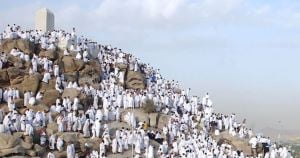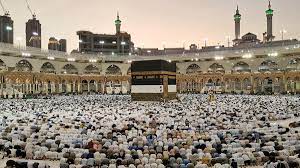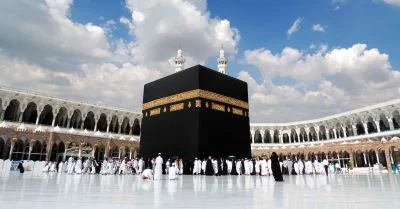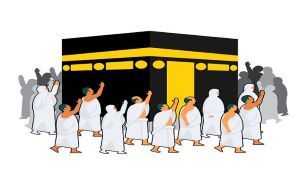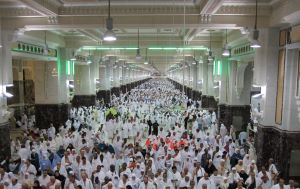Hajj: Its Rulings, Pillars,Manners and Obligations (Part 4)
Wuqoof (Standing at ‘Arafah) means to be present at ‘Arafah for a moment or more with the intention of standing there during the valid time.
The manner of performing wuqoof (standing at ‘Arafah).
Its rulings and obligations.
- Hajj consists of four pillars or areas that must be performed in order to complete it. The fourth pillar: Wuqoof (Standing at ‘Arafah) means to be present at ‘Arafah for a moment or more with the intention of standing there during the valid time. The valid time is from after Dhuhr prayer on the 9th of Dhul Hijjah to Fajr prayer on the 10th of Dhul Hijjah. There are certain obligations, sunnah acts, and manners that complete wuqoof.
- The obligatory acts are as follows:
- Being present at ‘Arafah on the 9th of Dhul Hijjah after noon until sunset.
- Spending the night at Muzdalifah after coming from ‘Arafah on the 10th night of Dhul Hijjah
- Throwing pebbles at the pillar of Al-‘Aqabah on the night of Nahr (sacrifice).
- Shaving or shortening the hair after stoning the pillar of Al-‘Aqabah on the Day of Nahr (sacrifice).
- Spending the night at Mina for three nights or two nights for whoever is in a hurry.
- Throwing pebbles at the three stone pillars after midday on each of the three days of Tashreeq
- The Sunan Acts are as follows:
- Going to Mina on the Day of Tarwiyah, which is the 8th of Dhul Hijjah and spending the night there. A person should not leave Mina until after sunrise and one should pray the five prayers there.
- The person should be present at Masjid an-Namirah after midday and pray the Dhuhr and ‘Asr prayers combined and shortened with the imaam.
- The person should go to the area of standing (on ‘Arafah) after offering Salah. The person should remain at his place of standing, remembering Allah ﷻ and praying until sunset. Nowadays, it is extremely difficult to get to Masjid an-Namirah and to move around on ‘Arafah, due to the extremely huge crowds. It is safer to avoid crowded areas such as Masjid an-Namirah. Wuqoof on ‘Arafah is valid anywhere within the boundaries of ‘Arafah. It does not have to be in or around the masjid.
- Delay the Maghrib prayer until one arrives at Muzdalifah, and then pray Maghrib and ‘Ishaa’ together there in the time of ‘Ishaa’.
- Stand facing the Qiblah after Fajr while remembering Allah ﷻ and praying at the Sacred Site until just before sunrise.
- Keeping the recommended sequence between throwing pebbles at the Pillar of Al-‘Aqabah, sacrificing an animal, shaving the head, and performing Tawaaf al- Ifaadah.
- Performing Tawaaf al-Ifaadah on the Day of Nahr before sunset.
- The correct method is as follows:
- Heading out from Mina on the morning of the 9th to Namirah.
- Performing a complete bathing after midday for standing at ‘Arafah.
- Standing at the place where the Messenger stood, which is at a large, spread out rock at the bottom of the Mountain of Mercy (Jabal ar-Rahmah).
- Uttering statements in remembrance of Allah ﷻ and praying in abundance.
- Walking slowly and not rushing to reach your destination.
- Recite talbiyah often on the way to Mina, until the person stones Al-‘Aqabah.
- Picking up seven pebbles from Muzdalifah to use for stoning Al-‘Aqabah.
- Leaving Muzdalifah after the sky has become yellowish before sunrise.
- Throwing pebbles at the Pillar of Al-‘Aqabah anytime between sunrise and midday.
- Saying Allaahu Akbar (Allah is Greater) with each pebble that one throws.
- Slaughtering the sacrificial animal.
- Eating from the sacrificial animal, as the Prophet ﷺ did.
- Stoning the three pillars during the days of Tashreeq while saying, Allaah Akbar.
If a Muslim carries out all the abovementioned actions, Allah will surely grant him/her the rewards that are due to them.
What we learn from the lesson:
- Wuqoof means to be present at the place that is called ‘Arafah for a moment or more with the intention of standing there during its valid time.
- The valid time is from after Dhuhr on the 9th of Dhul Hijjah to Fajr on the 10th of Dhul Hijjah.
- A Muslim must follow and practice the obligatory acts, sunan acts and the manners of wuqoof.

